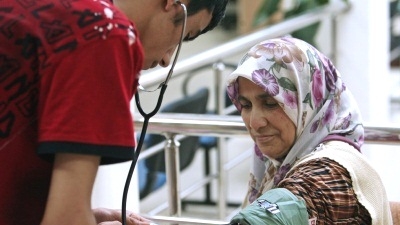Turkey’s health care efforts prioritized primary care in the initial phase and focused on expanding coverage and access to basic health care services. Thus, the level of health insurance coverage increased from 71% in 2003 to 99% in 2011. Performance incentives and improved monitoring enhanced the quality of medical services, while proactive assignment policies greatly reduced the disparities in the availability of health personal between the advanced west and less advanced eastern parts of the country. As a result of these and other efforts, life expectancy in Turkey increased by 5 years to 78 years for women and 6 years to 73 years for men between 2000 and 2011. The infant mortality rate was halved during the lifetime of this program - dropping from 28 per 1000 children born in 2000 to 12 in 2012.
The World Bank has supported the government through the Health Transition Project – which introduced a family medicine model and helped build the Ministry of Health and the Social Security Institute expand health insurance coverage – and the ongoing Project in Support of Restructuring of Health Sector - which supports reforms aimed at increasing hospital autonomy, expanding family medicine services, and strengthening performance management and pay-for-performance initiatives.
With Turkey emerging as one of the world’s success stories in the achievement of universal health care, Turkish officials are now looking at ways to share their experience with other countries. The recent Global Conference on Universal Health Coverage (UHC) for Inclusive and Sustainable Growth, held in Japan on December 6-7, provided an excellent opportunity for such knowledge sharing and brought Turkish policy makers together with colleagues from other countries, both successful and less successful ones.
“In Turkey, an economic crisis in the early 2000s prompted major government reforms and laid the groundwork for the 2003 Turkey Health Transformation Program,” noted World Bank President Jim Yong Kim during his speech at the Global Conference, “Outcomes are impressive: Today, more than 95 percent of the Turkish population is covered by formal health insurance. The Program now provides a high level of financial protection and equity while ensuring high and rising levels of patient satisfaction.”
A comparative study on achievements and remaining challenges in UHC, Global Synthesis: Lessons from 11 Country Case Studies, prepared for the Tokyo UHC conference finds that as countries move toward universal coverage, they continuously face difficult trade-offs between providing complete coverage and maintaining cost-effectiveness, particularly as the provision of health-care services tends over time to create its own demand.
Turkey’s achievements in health care reform duly can serve as a model for other countries. But in today’s dynamically changing world, Turkey too cannot afford to rest on its laurels, and must learn from the experiences of countries with rising health care bills after the achievement of UHC. This way, Turkey can continue to couple economic growth with improving social outcomes, and inspire many other developing countries to follow in its path.
“Turkey’s example proves that financial constraints - even a major financial crisis - can catalyze the expansion of coverage. The Bank Group has been pleased to partner with the Turkish government to support this effort,” concluded President Kim.

